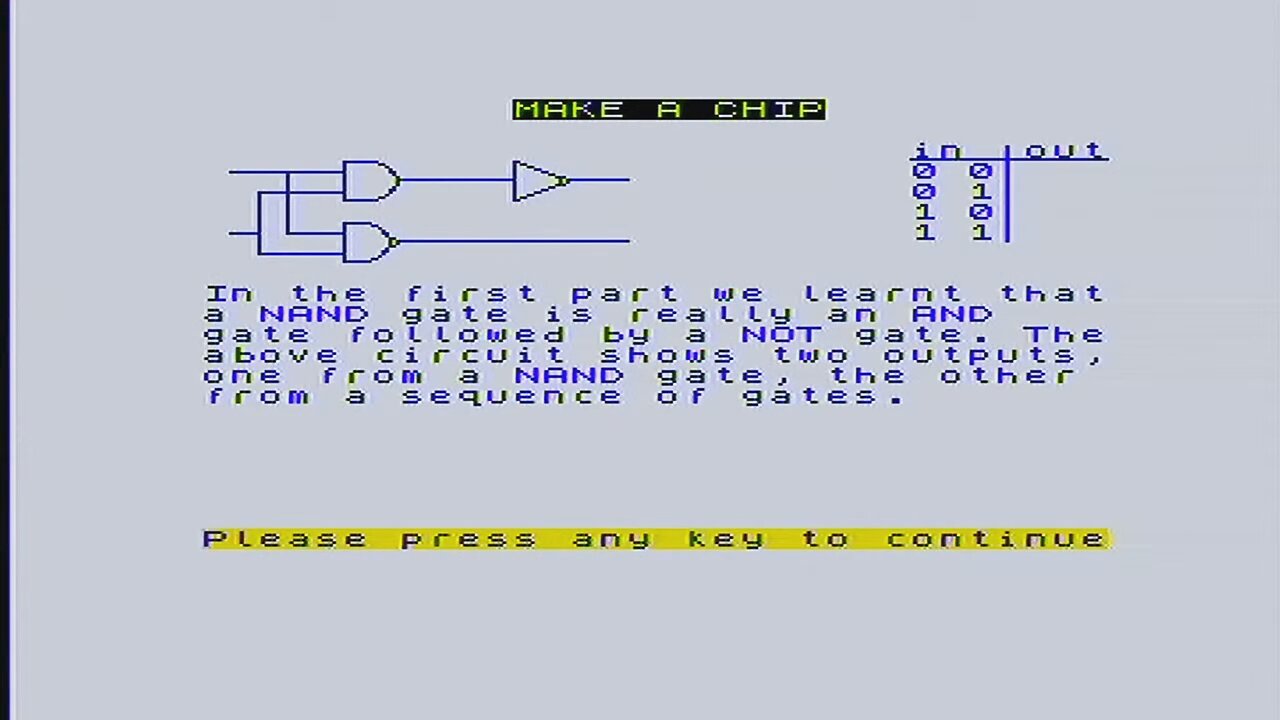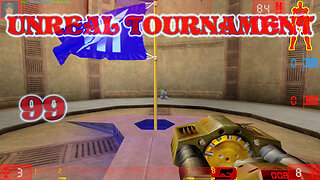Premium Only Content

Sinclair ZX Spectrum Make-A-Chip Cassette 48kb 8-bit Computers Retro Gaming Education
Sinclair ZX Spectrum Make-A-Chip Cassette 48kb 8-bit Computers 48k Ram
The Sinclair ZX Spectrum was a revolutionary platform in the early 1980s, bringing affordable computing to the masses and offering a wide array of software, including educational titles. Among these was Make-A-Chip, a unique educational program designed to introduce users to the basics of computer chip design and logic circuits. Released in the mid-1980s, this 48kb cassette-based program became a standout example of how the ZX Spectrum could be used for more than just gaming, making it a valuable tool for both education and entertainment.
Overview of Make-A-Chip
Make-A-Chip was an innovative educational program that allowed users to simulate the design of computer chips. By using the ZX Spectrum's simple yet effective interface, users could experiment with logic gates, inputs, and outputs, constructing virtual chips that could perform basic tasks. The program was aimed at young learners and hobbyists who were interested in electronics and computer science, offering them a hands-on way to understand the fundamentals of chip design.
The program was structured as a series of tutorials and exercises that guided the user through the process of creating a chip from scratch. Users could choose from various logic gates like AND, OR, NOT, and combine them to create more complex circuits. The visual representation of the chips and the immediate feedback provided by the program made it an engaging way to learn about a topic that was otherwise complex and abstract.
Make-A-Chip also included a variety of pre-designed chips that users could study and modify, allowing for deeper exploration of the concepts. This feature was particularly valuable for those who wanted to see practical examples of chip design before attempting their own creations. The program's user-friendly interface and step-by-step approach made it accessible to a broad audience, from school students to amateur electronics enthusiasts.
Creators and Year of Release
Make-A-Chip was developed and released during the mid-1980s, a period when the ZX Spectrum was at the height of its popularity. The program was created by a small team of developers who were passionate about using the ZX Spectrum as a tool for education as well as entertainment. Unfortunately, specific details about the creators and the exact year of release are scarce, as was often the case with many smaller software titles of the era. However, the program's impact on educational software for home computers remains undeniable.
The mid-1980s was a time of rapid advancement in both hardware and software for home computers, and Make-A-Chip was part of a broader movement to use computers as educational tools. The ZX Spectrum, with its widespread adoption and affordable price, was an ideal platform for such initiatives, making programs like Make-A-Chip accessible to a large audience.
The ZX Spectrum and Educational Software
The Sinclair ZX Spectrum was more than just a gaming console; it was a versatile home computer that offered users the ability to program, learn, and create. Released in 1982 by Sinclair Research, the ZX Spectrum became one of the most popular home computers of its time, particularly in the UK. With its vibrant 8-bit graphics and distinctive rubber keys, the ZX Spectrum captured the imagination of a generation.
Educational software like Make-A-Chip played a crucial role in ZX Spectrum's success. At a time when computer literacy was becoming increasingly important, the ZX Spectrum provided an affordable way for people to learn about computing and electronics. Programs like Make-A-Chip were particularly valuable because they made complex subjects accessible to beginners, fostering a new generation of tech-savvy individuals.
The ZX Spectrum's 48kb memory might seem limited by today’s standards, but developers of the time were adept at squeezing every last byte out of the machine to create rich and engaging experiences. This era of creativity and innovation is fondly remembered by retro computing enthusiasts, who appreciate the ZX Spectrum not just for its games but also for its contributions to education and personal computing.
Legacy and Impact
Make-A-Chip is remembered as a pioneering piece of educational software that demonstrated the potential of home computers as learning tools. While it may not have achieved the same level of fame as some of the ZX Spectrum’s blockbuster games, it holds a special place in the history of educational computing.
For many users, Make-A-Chip was their first introduction to the world of electronics and computer chip design. The knowledge gained from this program could be applied to more advanced studies in computer science and electronics, making it an invaluable resource for aspiring engineers and tech enthusiasts.
Today, Make-A-Chip is celebrated by retro computing fans who seek out old ZX Spectrum titles not just for nostalgia, but for the innovative spirit they represent. The program is a testament to the ZX Spectrum’s versatility and its role in shaping the future of computing and education.
Played on my improved ZX Spectrum +2A :-)
The ZX Spectrum is an 8-bit personal home computer released in the United Kingdom in 1982 by Sinclair Research. Make-a-Chip for Sinclair ZX Spectrum. Make a Chip was an educational program for the Sinclair ZX Spectrum, which became available in 1983. 0:05 Sinclair ZX Spectrum Make-A-Chip Cassette 48kb 8-bit computers Retro Gaming Education
For more stunning videos be sure to SUBSCRIBE:
Thank you for watching.
For more stunning videos be sure to follow, like and subscribe.
#MakeAChip #SinclairZxSpectrum #Tuning #ZXSpectrum #VideoGames #SpectrumGames #Speccy #ArcadeGames #RetroGaming #Gaming #Classic #ZxSpectrum2B #Education #8bitComputers #EducationalSoftware #SinclairResearch #LogicCircuits
For more stunning videos be sure to follow my websites and social media:
https://lindasunshine.com
https://twitter.com/LindaSunshine66
https://www.tiktok.com/@lindaperth
Thank you for watching
-
 3:57
3:57
ZX Spectrum Retro Gaming
11 months agoNucleus Capture the Flag Mastering Unreal Tournament 99
35211 -
 30:49
30:49
MetatronHistory
1 day agoThe Truth about Women Warriors Based on Facts, Evidence and Sources
17.2K11 -
 2:59:08
2:59:08
FreshandFit
11 hours agoA Sugar Baby & A Feminist ALMOST Fight Each Other
244K46 -
 6:24:23
6:24:23
SpartakusLIVE
9 hours agoFriday Night HYPE w/ YOUR King of Content
103K1 -
 2:27:53
2:27:53
Laura Loomer
7 hours agoBREAKING: MTG Resigns From Congress, Mamdani Meets Trump
69.9K101 -
 3:30:10
3:30:10
PandaSub2000
1 day agoDisney & Buzz Trivia | PHOENIX & HAVIX (Original Live Version)
33.6K -
 15:23
15:23
T-SPLY
11 hours agoBUSTED Assistant Principle And Brother Arrested For Wanting To Kill ICE!
31.4K13 -
 22:06
22:06
Jasmin Laine
12 hours agoCBC STUNNED Into SILENCE After JD Vance’s BRUTAL Message to Canadians
23.9K12 -
 2:04:27
2:04:27
TimcastIRL
11 hours agoAntifa CONVICTED Of TERRORISM, Fears Of CIVIL WAR Grow | Timcast IRL
255K93 -
 2:16:43
2:16:43
TheSaltyCracker
8 hours agoIt's Over Zelensky ReeEEStream 11-21-25
93.5K139